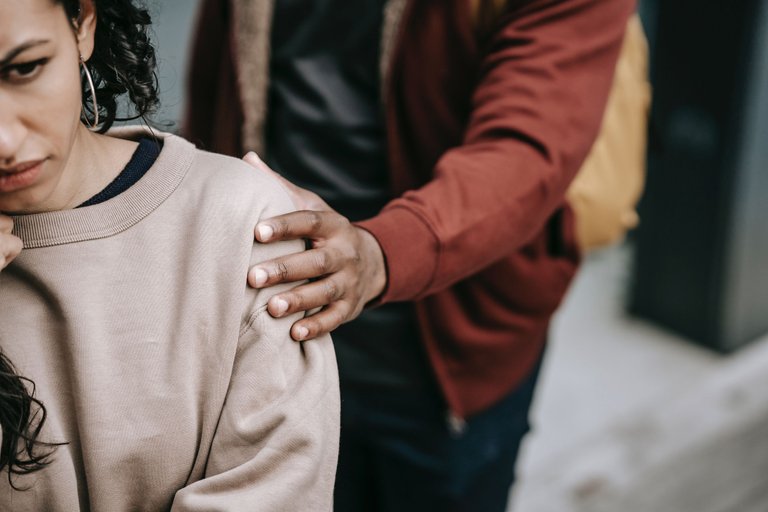
Ante un conflicto: ¿Hablar o callar?

Es un gusto estar con ustedes con mis queridos lectores de Hive, para seguir compartiendo con ustedes un poco más sobre lo que he aprendido y me parece importante que tengamos en cuenta en nuestra vida diaria, sobre todo en estos tiempos quién de nosotros no se ha visto ante la decisión de ¿Hablar o callar?
En un mundo donde existen muchos conflictos por distintas causas, por ejemplo debido a que las situaciones cotidianas nos llevan a sentirnos presionados o debido a situaciones que nos hacensensibles y hasta por nuestro entorno es decir factores que no podemos controlar, como que las personas que nos rodean sean a ser muy duros al hablar, por cualquiera de esas razones pueden haber conflictos.
It is a pleasure to be with you with my dear readers of Hive, to continue sharing with you a little more about what I have learned and I think it is important that we take into account in our daily lives, especially in these times, who of us has not been faced with the decision of "Speak or shut up?
In a world where there are many conflicts for different reasons, for example because everyday situations lead us to feel pressured or because of situations that make us sensitive and even because of our environment, that is, factors that we cannot control, such as the people around us being very hard to talk to, for any of these reasons there may be conflicts.
Entonces cuando ya ha ocurrido una situación que nos incomoda no sabemos qué hacer, ¿cuál será la mejor decisión quedarnos callados o hablar al respecto? En mi caso soy de esas personas que no le gustan los conflictos, que muchas veces prefieren evitar tanto que se presenten como confrontarlos y en ocasiones prefiero esperar un tiempo, y entonces solo si es necesario confrontar la situación. Esto es bueno en un sentido, porque evitaremos ser nosotros los que deseamos evitar conflictos, pensaremos en como evitar palabras sin antes meditar en el efecto que puedan tener, pero ¿Será siempre lo mejor no decir nada?
Cuando surge un problema no siempre es bueno tomar de una vez cartas en el asunto, en ocasiones será bueno pasarlo por alto, ver lo que no es tan evidente, ¿por qué aquella persona reaccionó así? , ¿Esta pasando un mal momento? Y aunque esto no justifica su error, podemos ser más condecendientes ya que muchas veces cuando pasan los días y se calman la cosas nos damos cuenta de que la situación no ha sido tan grave como se veía al principio.
So when a situation that makes us uncomfortable has already happened, we do not know what to do, what will be the best decision to keep quiet or talk about it? In my case, I am one of those people who do not like conflicts, who often prefer to avoid them as much as to confront them, and sometimes I prefer to wait for a while, and then only if it is necessary to confront the situation. This is good in one sense, because we will avoid being the ones who want to avoid conflicts, we will think about how to avoid words without first meditating on the effect they may have, but is it always best not to say anything?
When a problem arises it is not always good to take action at once, sometimes it will be good to overlook it, to see what is not so obvious, why that person reacted that way? Is he/she going through a bad moment? And although this does not justify their mistake, we can be more forgiving because often when the days go by and things calm down we realize that the situation has not been as serious as it seemed at the beginning.
Si, en cambio, vemos que no se pueden calmar las cosas sin conversar, es necesario que tomemos acciones para resolver los problemas; sin embargo, esto requerirá valor y una buena actitud porque si en realidad queremos resolver los asuntos necesitamos humildad y un sincero deseo de solucionarlo.
Muchas veces, luego de hablar si ambas personas lamentan estar pasando por esa situación, ya no es necesario hacer algo más, porque ambas han dado su brazo a torcer, sin embargo, en ocasiones no es así, quizás hemos causado un profundo daño y tengamos que convencer a esa persona de que en realidad lamentamos lo sucedido.
If, on the other hand, we see that things cannot calm down without talking, we need to take action to resolve the problems; however, this will require courage and a good attitude because if we really want to resolve the issues we need humility and a sincere desire to solve it.
Many times, after talking if both people are sorry to be going through that situation, it is no longer necessary to do anything else, because both have given their arm to twist, however, sometimes it is not like that, maybe we have caused a deep damage and we have to convince that person that we really regret what happened.
Para hacer las pases, es importante que la otra persona llegue a ver que en realidad lo sentimos y que deseamos hacer algo para remediar la situación. Este solo es un aspecto donde debemos considerar si callar o hablar, pero existe otro de gran importancia, cuando los que nos sentimos heridos o molestos somos nosotros, en ese caso dependiendo de la profundidad de nuestros sentimientos podemos elegir pasarlo por alto si creemos que podemos olvidar ese malentendido o hablar, si sucede que esa situación incomoda o dolorosa continuamente está dando vueltas en nuestra cabeza y no conseguimos olvidarlo, debemos expresarnos para impedir que la herida se haga más profunda y la distancia más grande.
A fin de cuentas, elegir si callar o hablar dependerá del efecto que tenga una de las dos opciones en la situación,¿ Cuál es la más conveniente? ¿cuál de ellas nos ayudará a mejorar las cosas? Si elegimos callar que sea para el silencio sane la herida y si elegimos hablar que sea para encontrar la solución al problema.
To make amends, it is important that the other person gets to see that we are really sorry and that we want to do something to remedy the situation. This is only one aspect where we must consider whether to keep quiet or talk, but there is another of great importance, when we are the ones who feel hurt or upset, in that case depending on the depth of our feelings we can choose to overlook it if we believe we can forget that misunderstanding or talk, if it happens that this uncomfortable or painful situation is continually going around in our head and we can not forget it, we should talk about it.
At the end of the day, choosing whether to remain silent or to speak will depend on the effect that one of the two options will have on the situation, which is more convenient, which one will help us to improve things? If we choose to remain silent, may the silence heal the wound, and if we choose to speak, may it be to find the solution to the problem.
No podemos controlar todo lo que sucede a nuestro alrededor, pero si podemos elegir sabiamente muestra reacción y así vivir en armonía. ¡Les envío un fuerte abrazo mis queridos lectores!
We cannot control everything that happens around us, but we can choose wisely our reaction and live in harmony. I send you a big hug my dear readers!



Entiendo tu punto de vista, yo en situaciones prefiero hablar y no callar, siento que es más fácil sanar hablando. Éxitos
Gracias por leerme y por dejar tu comentario 😊 @luisanarincon7 es muy necesario hablar en la mayoría de las oportunidades, felíz noche para ti❤️
Claro que si, éxitos
A veces es necesario callar y en otras hablar, el tema es saber cuando es bueno lo uno y lo otro es lo que debemos aprender a diferenciar, el otro tema es la manera de haber y de callar, pues en mi caso lo que no digo con la boca se me ve en el rostro. Pero si muchas veces hay que abrirse y decir lo que se siente para sanar heridas y reconciliarse .